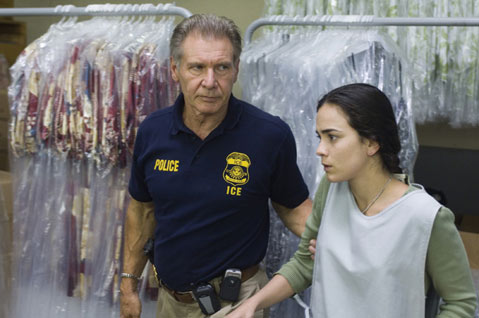
Interspersed in the narrative maze that is Crossing Over, a valiant if fumbling attempt to address the immigration problem in contemporary America, are aerial shots of the tangled freeway interchanges in Los Angeles. That image becomes a handy metaphor for the subject at hand. L.A.’s ever-thickening freeway grid is an elaborate system for keeping traffic flowing smoothly, but inevitably gets bogged down in traffic jams, Sigalerts, and other maladies with no easy solution.
In taking on the labyrinthine problems connected with immigration in contemporary America, writer/director Wayne Kramer opts to create its own labyrinth design, which partly is the film’s undoing. Much as we try to view Crossing Over on its own merits, it’s hard not to compare the film to the puzzle-patterned “social issue” mazes of Crash and Traffic. The former takes on racism in Los Angeles and the latter entrenches us in the toxic honeycomb of drug trafficking and enforcement.
With Crossing Over, the sweeping immigration problem in this nation of immigrants is told through a multicultural mosaic, in neighborhoods and strained situations all over Los Angeles. The film hop-scotches between a raid in a sweatshop, an emotional robbery in Koreatown, a Mexican boy returned to his home in Tijuana, an Iranian family with a fierce moral code, a crooked immigration official using his power to gain sexual favors, and an African girl waiting for word from her AIDS-afflicted mother.
Things get too messy and too tidy in the mix. Good guys are good, bad guys are bad, and character gray zones are rare. Harrison Ford is an ICE agent who has pangs of conscience and compassion in the course of his raids, while Ray Liotta again reveals his gift for playing slimeballs as a petty immigration official trading sex for green cards. Meanwhile, Liotta’s wife is the “enemy,” an immigration lawyer fighting for the rights of the soon-to-be-deported.
This checkerboard composite of slices of L.A. life might have been more impressive without the manipulative overlays and TV-style sentimental shallowness. But Crossing Over nonetheless is an engaging and noble effort to take on a problem hiding in plain sight, especially in the deceptively breezy, freeway-choked landscape of Southern California.



